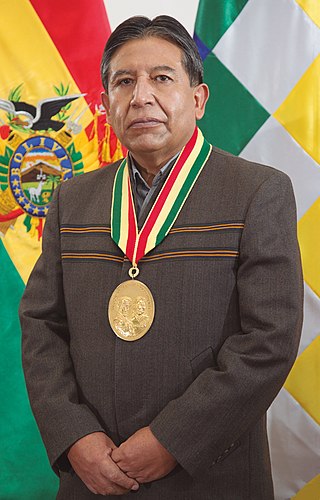
The Brazilian Space Agency is the civilian authority in Brazil responsible for the country's space program. It operates a spaceport at Alcântara, and a rocket launch site at Barreira do Inferno. It is the largest and most prominent space agency in Latin America.

Túpac Katari or Catari, born Julián Apasa Nina, was the indigenous Aymara leader of a major insurrection in colonial-era Upper Peru, laying siege to La Paz for six months. His wife Bartolina Sisa and his sister Gregoria Apaza participated in the rebellion by his side. The rebellion was ultimately put down by Spanish loyalists and Katari was executed by quartering.

David Choquehuanca Céspedes is a Bolivian diplomat, peasant leader, politician, and trade unionist serving as the 39th vice president of Bolivia since 2020. A member of the Movement for Socialism, he previously served as minister of foreign affairs from 2006 to 2017 and as secretary general of ALBA from 2017 to 2019.
The Brazilian space program is the rocketry and space exploration programs conducted by Brazil from 1961, under GOCNAE until the creation of the Brazilian Space Agency in 1994. It has significant capabilities in launch vehicles, launch sites, and satellite manufacturing. It is based at the National Institute for Space Research (INPE), under the Ministry of Science and Technology (MCT). Upon its founding the program was under complete military control, which hindered its development, as other countries blocked technological development due to concerns over missile proliferation. In 1994, the space program was transferred to civilian control under the Brazilian Space Agency.

The Mexican Space Agency is the national space agency of Mexico, established in July 2010. The agency does not have infrastructure, and aims to promote and coordinate education, research and development of the space-related activities that are performed in the country.

The China–Brazil Earth Resources Satellite program (CBERS) is a technological cooperation program between Brazil and China which develops and operates Earth observation satellites.

The Ecuadorian Civilian Space Agency is a private Ecuadorian organization founded in 2007 that conducts research on space and planetary sciences. It is a non-profit non-governmental organization with civilian oversight.

Entel S.A. is a major Bolivian state-owned telecommunications company, headquartered in La Paz, Bolivia.
Xatcobeo, originally known as Dieste, is a project to build the first Galician artificial satellite developed by Agrupación Estratéxica Aeroespacial of the University of Vigo and leadered by Fernando Aguado in collaboration with the Instituto Nacional de Técnica Aeroespacial (INTA) and with the support of the Galician government-owned corporation Retegal. The project was presented to the European Space Agency for its launch in the inaugural flight of the Vega rocket from the Guiana Space Centre, in Kourou. Its life will be between 6 and 12 months, and its cost will be around 1.2 million euros, being 50% funded by the Ministerio de Ciencia e Investigación of Spain, 25% by Retegal and in the last 25% jointly by the University of Vigo and INTA.

Bolivia–China relations are foreign relations between the Plurinational State of Bolivia and People's Republic of China. Relations between both nations officially began on July 9, 1985. Both nations are members of the United Nations.

The National Institute for Space Research is a research unit of the Brazilian Ministry of Science, Technology and Innovations, the main goals of which are fostering scientific research and technological applications and qualifying personnel in the fields of space and atmospheric sciences, space engineering, and space technology. While INPE is the civilian research center for aerospace activities, the Brazilian Air Force's General Command for Aerospace Technology is the military arm. INPE is located in the city of São José dos Campos, São Paulo.

The Bolivarian Agency for Space Activities is an agency of the Ministry of Science of Venezuela, responsible for developing and carrying out policies of the National Executive Venezuela regarding the use of the outer space.
Túpac Katari 1 or TKSat-1 is a telecommunications satellite that the government of Bolivia outsourced to People's Republic of China (PRC) to serve telecommunications in Bolivia, such as mobile, television and Internet use.

The space program of the Philippines is currently maintained by the Philippine Space Agency (PhilSA) together with various agencies under the Department of Science and Technology (DOST). The space program includes space research and development, and is funded through the National SPACE Development Program (NSDP) by the DOST and received an initial budget of ₱1 billion in 2020.
The Catalan Space Agency is a project approved by the Executive Council of the Generalitat de Catalunya on October 27, 2020, and which aims to launch two nanosatellites in the first half of the year 2021. The project, with an initial duration of two years until 2023, envisages the launch of a constellation of up to six satellites with a public investment of 21 million dollars over four years with part of the co-financing from the European Regional Development Fund. The project would be led by the Ministry of Digital Policies, the Department of Business, and the Department of Territory, and would be part of the plan called "NewSpace Strategy of Catalonia" or "Estratègia NewSpace de Catalunya".
Portugal Space is the Portuguese Space Agency created by the Portuguese government in collaboration with the regional government of the Azores in 2019. It is headquartered at Santa Maria Island, in the Azores, Portugal. The agency succeeds the Space Office of the Foundation for Science and Technology.
The Agencia Espacial Española is an agency of the Spanish government responsible for the Spanish space program. The agency was officially announced on 27 May 2021 and it became operational in 20 April 2023.
Latin American and Caribbean Space Agency is an international space exploration organization based in Mexico, comprising several countries in Latin America and the Caribbean region. It was established in 2021 as part of the Latin American space race. According to its charter, its objective is to coordinate the space cooperation activities of Latin American and Caribbean countries for the peaceful use and exploration of outer space, the Moon and other celestial bodies.











